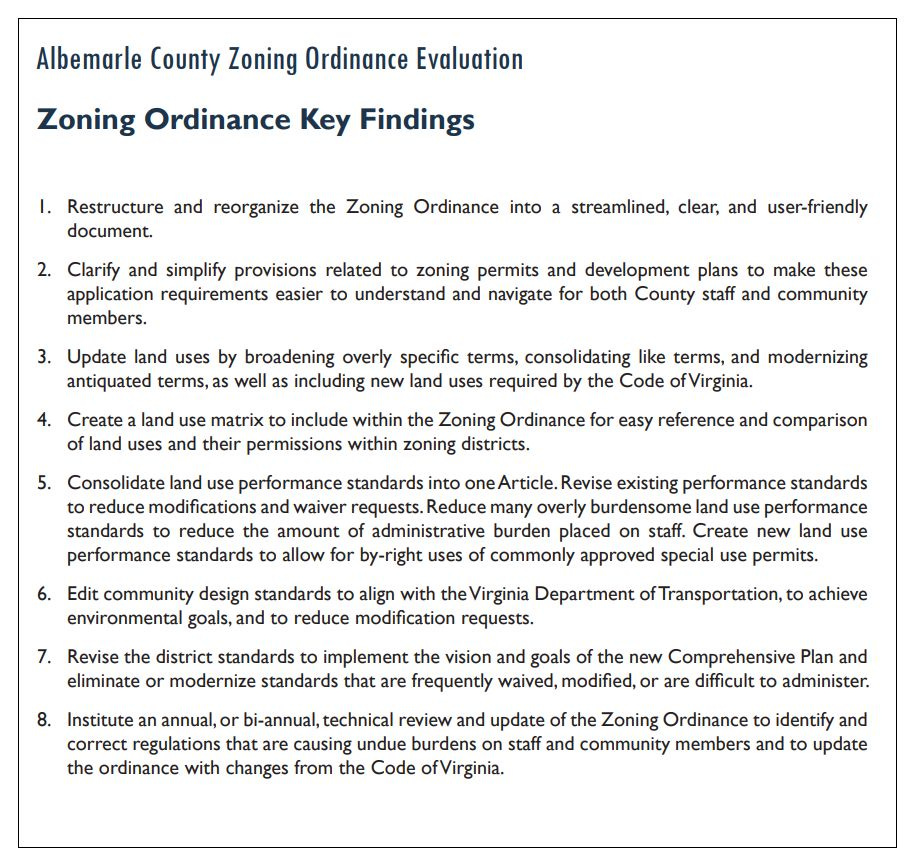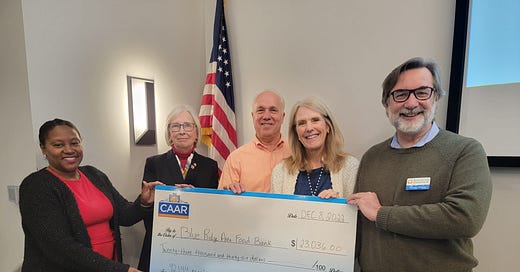And like that, the holiday slowdown is over and it is back to some semblance of a regular schedule here on Charlottesville Community Engagement. 2022 is almost over, and it’s time for each of us to reflect on what took place. For me, there have been 363 days so far. What about you?
On today’s show:
An outdoor pool and health club is planned at the intersection of Interstate 64 and U.S. 29
Area groups continue to raise money for the Blue Ridge Area Food Bank
There are only two days left to grocery shop in Albemarle and Charlottesville without paying a five cent tax for each plastic bag
Three area groups have won local food infrastructure awards from Governor Glenn Younkin
An update on the status of the zoning rewrite in Albemarle County
Sponsored message: Buy Local
Charlottesville Community Engagement’s continued existence means that many of you support local information. Want to also support some local businesses as this holiday season continues toward the New Year? The Buy Local campaign is in full swing, and both the Albemarle and Charlottesville Offices of Economic Development want people to consider spending locally as they shop this year.
The Buy Local campaign highlights small businesses within Charlottesville and Albemarle County through a multi-channel, multimedia promotional and educational campaign designed to reinforce how important supporting area small businesses is to the local economy.
The campaign will continue long after the holidays. Locally-owned, independent businesses with a brick-and-mortar presence in the City or County interested in being featured in the campaign should visit www.showlocallove.org or contact info@showlocallove.org.
For more information on the Buy Local campaign, visit www.ShowLocalLove.org or follow us on Facebook and Instagram @BuyLocalCvilleAlbemarle or on Twitter @BuyLocalCville.
Plans filed for health club next at Sieg property
The owners of a beer distribution facility at the intersection of Interstate 64 and U.S. 29 have filed plans with Albemarle County for a health club and pool. The project would be constructed on property just to the north of the existing Virginia Eagle Distributing and is within the jurisdiction of the Albemarle Architectural Review Board. (ARB202200111)
The land is zoned for Highway Commercial and the site plan states the project can proceed on well and an onsite septic system.
The project would include a 5,445 square foot eight-lane outdoor pool with a 3,150 square foot spa and gym and two pickleball courts. There would be 70 parking spaces.
The pool and health club is outside the scope of a rezoning request made by Riverbend Development for 145 acres of nearby land. A community meeting for that project was held in August after the application was made in late February. (ZMA202200002)
Albemarle Turkey Farm, New Hill Development, and Nelson County all secure state food infrastructure funds
Three projects in our area have secured funding from the Commonwealth of Virginia to help expand the local food industry. Governor Glenn Youngkin has announced ten grants totaling $368,885 from the Agriculture and Forestry Industries Development Grant Program.
One is $24,000 for Kelly Turkeys in Albemarle County to purchase equipment to begin grinding turkey for sales.
“In operation since 2015, Kelly Turkeys grows and processes KellyBronze birds, an internationally known breed of heritage turkeys raised using sustainable farming methods,” reads the press release.
The second is for $50,000 for a request from the Charlottesville Economic Development Authority for a commercial kitchen for the Black Entrepreneurial Advancement and Community Opportunity Network (BEACON) intended to help up to 16 local food businesses.
Nelson County will receive $25,000 to help purchase UltraPV apple processing equipment for Silver Creek and Seaman’s orchards that will allow for output to triple.
“The UV treatment allows orchards to produce an FDA-approved product with an extended shelf life, which will allow locally produced cider to be distributed throughout the region,” reads the press release.
Other projects in the state include:
$21,500 for a commercial kitchen in Bedford County for EcoFriendly Foods
$50,000 for the Virginia Produce Company to expand its vegetable processing in Carroll County
$50,000 for a commercial kitchen in Culpeper County at the George Washington Carver Food Enterprise Center
$33,333 for a meat processing plant in Franklin County
$15,502 for a farmer’s market in the City of Galax
$50,000 for a commercial cannery in Prince Edward County
$50,000 for an entity called the Local Environmental Agriculture Project (LEAP) for a food hub in Roanoke
Groups raise money for Blue Ridge Area Food Bank
It’s the time of year when so many are raising funds for various causes, and this is the time in the newsletter when I can report some of what’s happened.
The Charlottesville Area Association of Realtors raised $23,140 in November for the Blue Ridge Area Food Bank, including a $10,000 match from Realtor Sally Neill and Peter Neill.
“Their latest effort, with a generous matching gift by a fellow REALTOR®, will help provide over 92,500 meals to children, families, and seniors in our area,” wrote Millie Winstead, Blue Ridge Area Food Bank Director of Development & Community Engagement, in a press release. “Between the historic rise in the cost of food and everyday necessities, and onset of the winter season with the historic inflated prices for fuel, our guests face impossible choices.”

If you’d like to help with another program to provide resources to the Blue Ridge Area Food Bank, Home Services for the Holidays is still collecting non-perishable food items on service calls. Participating companies include Albemarle Heating & Air, Beck Cohen, Jones Heating & Air, Monticello Air, Restoration 1, W.E. Brown, and the Noland Company. They’re taking collections through Saturday. Learn more on their Facebook page.
Reminder: Plastic bag tax begins Sunday
Here’s another reminder that on Sunday, retail stores in Albemarle and Charlottesville including groceries will begin to charge a five cent tax for each plastic bag used to carry out purchases. Both the Board of Supervisors and the City Council approved the new tax levy earlier this year.
“All revenue from a tax imposed shall be appropriated for the purposes of environmental cleanup, providing education programs designed to reduce environmental waste, mitigating pollution and litter, or providing reusable bags to recipients of Supplemental Nutrition Assistance Program (SNAP) or Women, Infants, and Children Program (WIC) benefits,” reads the section of Albemarle’s Fiscal Year 2023 budget that describes how the money is to be used.
Albemarle’s budget anticipates $20,000 in revenue in the first six months of 2023. Charlottesville’s adopted budget does not include an anticipated amount expected to be raised as Council levied the task later in the year after the budget was adopted.
On Tuesday, the city’s Office of Community Solutions sent out notice of two places where people can drop off reusable bags to be distributed to others so they can avoid the five-cent tax. These are:
Refill Renew, 1717 Allied Lane off Harris Street, Charlottesville
Dogwood Refillery at 190 Zan Road, Charlottesville
Second shout-out: Magic on the Mall
In today’s first Patreon-fueled shout-out, the Friends of Charlottesville Downtown and the Charlottesville Albemarle Convention and Visitors Bureau want you to visit Downtown for Magic on the Mall until January the 8th.
Festive activities include the Peppermint Trail where you can find all sorts of treats and a magical scavenger hunt to find the Elves in Cville by starting at Charlottesville Insider or downloading it online! For a full list of participating businesses and locations, visit friendsofcville.org. They also encourage you to vote in the storefront window decorating competition via QR code and enter the end of year giveaway for a $1,000 downtown gift card!
Albemarle Planning Commission briefed on zoning rewrite
There have been many words written in Charlottesville Community Engagement about the land use reform underway in the city since the first newsletter back in July 2020. But there have been fewer stories written about Albemarle County’s ongoing efforts to update its Comprehensive Plan and its zoning code at the same time.
Either way, if you want to go back through the archive on Information Charlottesville, there are two categories you can skim:
At their last meeting on December 13, the Albemarle Planning Commission got an update on what’s being called a “modernization” of the zoning code. Before we get into the details, it should also be noted that the Rio District has been unrepresented on the Commission since July when Daniel Bailey resigned.
The zoning work session was kicked off by Lea Brumfield, a senior planner with Albemarle County. (view the presentation)
“The ordinance has not undergone a complete overhaul since it was adopted in 1980,” Brumfield said. “We have made a number of amendments in the intervening 40 years but the ordinance is in need for an overall reorganization and an overall cleaning up.”
The intent is to make the code more clear and more user-friendly. Albemarle has hired the Berkley Group to do a lot of the work. The Bridgewater-based government consulting firm is doing similar work in Pittsylvania County as well as assisting Nelson County with its Comprehensive Plan update.

Since the beginning of the year, the scope and direction of the work has changed. The original idea had been to make some tweaks to rules such as those for setbacks and to streamline some of the language.
“But following two work sessions in April and June, we did come to the realization that the project needed to be restarted from the ground up,” Brumfield said.
Unlike the Comprehensive Plan work, most of the work has not been very public. Since a second kick-off meeting in August, the six Planning Commissioners were interviewed by the Berkley Group as were staff.
“Albemarle County staff also gave a tour of the County to Berkley Group staff to help familiarize them with the County and highlight specific development areas, design standards, and uses in the community,” reads a section of Appendix C in the report written for the December 13 meeting (page 83). “Three of the major focus areas visited during this tour was the Broadway Street industrial area, the Brookhill Neighborhood Model development, and the Foothills Crossing subdivision in the Crozet area.”
Representatives from the development community had the opportunity to ask their questions at a listening session on November 10.
“We’ve kind of got three buckets,” said Rebecca Cobb, a planner with the Berkley Group. “We’re going to do investigations, we’re going to develop content, and then there will be adoption. And so for this phase one, we’ve done most of the investigation and you all participated in some of that.”
There is to be an open house in January for the public to review the work of phase one to date. If you’re interested, reading the summary of the engagement is probably worthwhile to see what those who work with the code most have to say. Here are some highlights from the first of 15 pages of notes.
“The current ordinance is overly complex and difficult to navigate, making it overly burdensome to administer and unapproachable for community members,” reads the top bullet point.
“Density and building height should be updated for a growing community that has both urban and rural land,” reads the eleventh.
“The Neighborhood Model District should be reevaluated following the completion of the Comprehensive Plan update process as it is overly difficult to administer and long-term use as its own zoning district may continue to add administrative burdens,” reads the twelfth.
Here’s some of the highlights as stated by Rebecca Cobb.
“Lengthy approval processes… a desire for more by-right uses… there was also a common thread about increasing density and building height in specific areas… and then re-evaluating the Neighborhood Model,” Cobb said.
The ability to do customized zoning areas through the Neighborhood Model District was adopted by the Board of Supervisors in 2001 as a way to help encourage walkable communities in the development areas.
Now, so far all of the engagement work on the zoning code has been for developers and other stakeholders in the game. A public engagement plan is in the works and one commissioner wanted to know how success in that realm would be measured.
“How do we know if we’re successful in those exercises?” said Planning Commissioner Corey Clayborne. “Ten people could engage and we could say ‘we did it,’ right?”
“We do plan on having some metrics and kind of monitoring and seeing, you know, are people visiting the webpage? How many people responded to the survey?” Cobb said. “And I think the end result of knowing how successful it is if we’re getting information and answers that we can really utilize and make changes in the ordinance. It shows that people are understanding what we’re talking about and we are answering needs.”
Much of that monitoring will be handled by the county’s engagement staff. This month, two new community coordinators were introduced.
Commissioner Lonnie Murray said he had a concern about some of the tone of the zoning diagnostic.
“As I go through here, I see a lot of things about expediting or about various policies being barriers to development of barriers to this or that, and I think it’s worth noting that a lot of our policies come about because we explicitly were trying to stop things from happening in certain area and natural resources being affected,” Murray said. “So the fact that it is difficult to build on a critical slope or to build on a floodplain, those are not done to be barriers. They are done to protect a resource.”
Commissioner Karen Firehock agreed that the county should set a high standard for development in sensitive areas.
“One of the things I circled in the document was that you made an example of [Federal Emergency Management Agency] and our standards being a little more stringent than FEMA, and that’s an example of ‘yes! That’s a good thing!’ Charlottesville doesn’t mind if you build in the 100 year flood plain. Part of our stringency has to do with the aftermath of Hurricane Camille and the loss of lives. It’s really actually a really bad idea to develop in the hundred year flood plain.”
Firehock also noted that the county is very short-staffed at the moment and efforts to expedite processes may not work if there aren’t people to do the work. She also suggested priorities for what should move ahead faster.
“Some localities have engaged in a different kind of expediting which is greenlighting,” Firehock said. “We’ve lost a lot of our ability to acquire things like on-site water quality treatment for example. But if you do enough of the sort of the ‘green things’ in your application, you can get in a different pile to be reviewed faster.”
Firehock said that could include permeable pavement and green roofs.
Two future work sessions with the Planning Commission will take place in the first half of 2023.
Reading material:
Q&A: Charlottesville’s New Chief on the Task Ahead, His Time at UVA, Rob Seal, December 21, 2022
Key Crozet building closed by water damage, Hawes Spencer, Charlottesville Daily Progress, December 27, 2022
Charlottesville Councilor Michael Payne pushes to add Westhaven renovation to budget, Dryden Quigley, NBC29, December 28, 2022
Concluding notes for #476
I took a few days off, and the temptation was to take another. But yet here I am at the end of another newsletter making myself stop writing so I can get this out. I already have three other stories that could have fit into this one. I want to write as much as I can, and glad to be on my way toward getting back in the groove as I can.
Thank you to all of the people who have signed up for paid subscriptions in December! Your personalized thank you notes will be on the way. That included two $200 a year founding members, which comes with two shout-outs a month as well as my gratitude.
I spend my days going through as much as I can to bring you as much information as I can. You’re helping pay for this experiment in journalism, and I am grateful for the founding members, as well as the $5 a month supporters and the $50 a year supporters.
No matter the amount, Ting will match the first payment and there’s a couple of days to add to the list for December. Ting is an internet provider that’s helps build community, and I’d say their support of this publication fits the description.
Why not give yourself the gift of faster broadband? Ting can help! If you sign up at this link and enter the promo code COMMUNITY, you’ll get:
Free installation
A second month for free
A $75 gift card to the Downtown Mall


















Share this post